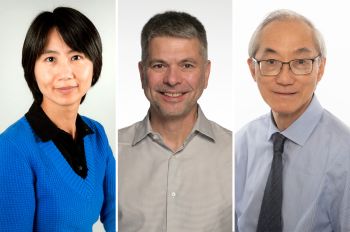Rehabilitation counseling education graduate students receive 2018 SFBTA research grant
First-year rehabilitation counseling education Ph.D. students Katherine Nieweglowski and Sang Qin received a 2018 Solution-Focused Brief Therapy Association (SFBTA) research grant for their proposal, “Using Solution-Focused Brief Therapy to Improve Self-Advocacy Skills for College Students with Disabilities.” Nieweglowski and Qin will be recognized at the SFBTA Conference in Boulder, Colo. in November.
During the Fall 2017 semester Nieweglowski and Qin worked with Associate Professor E.J. Lee to develop a series of workshops that focused on promoting employment readiness for students with disabilities. Held during the following semester, the workshops focused on self-advocacy, career development, disabilities rights, and impression management. Both Nieweglowski and Qin co-facilitated the workshops with Illinois Tech faculty.
“The students who participated in the workshops said that they enjoyed the solidarity and sense of community they gained from being around others with similar experiences,” explained Nieweglowski. “Although they found the workshops to be informative, many students said that the curriculum was more of a general overview and not tailored enough to their individual situations.”
For this research project, Nieweglowski and Qin will revise the workshop curriculum based on the feedback they received from the initial workshop cohort and incorporate solution-focused brief therapy—brief counseling sessions that focus on solutions rather than problems—with the goal of helping students identify when they need to be self-advocators and how to best advocate for themselves in the moment. The revised sessions will allow students to share their individual concerns and experiences while providing encouragement for one another.
“A lot of the motivation to continue attending the workshops was bonding with the other students, so we will continue with the group setting for the next sessions,” says Qin. “In a group counseling setting, the students will not only learn new skills but will also be able to help each other with issues they face.”
The updated workshop series will launch during the Spring 2019 semester. The program outcomes will be measured based on changes in participants’ mental health and confidence related to self-advocacy and career-efficacy skills at the end of the sessions. Long-term, Nieweglowski and Qin hope that the program can be used as a model to launch similar workshops at other universities for students with disabilities.
When asked about their motivations to work on this project Qin said, “I am excited about this project because it is a combination of research and practice. This is my first time providing services to college students and I feel like I can really relate to them. I’ve quickly learned that the students with disabilities have a lot of needs and their voices need to be heard.”
Nieweglowski added, “Similar to Sang, I love being a researcher in the counseling field because you can integrate the two—you can provide counseling services to students while conducting research. I am passionate about helping those with disabilities and am personally invested in this project because, as someone with a disability, I understand how difficult it can be to self-advocate and be successful. People with disabilities are underrepresented in so many areas and research projects like this will help bring the issues they face to the forefront.”




